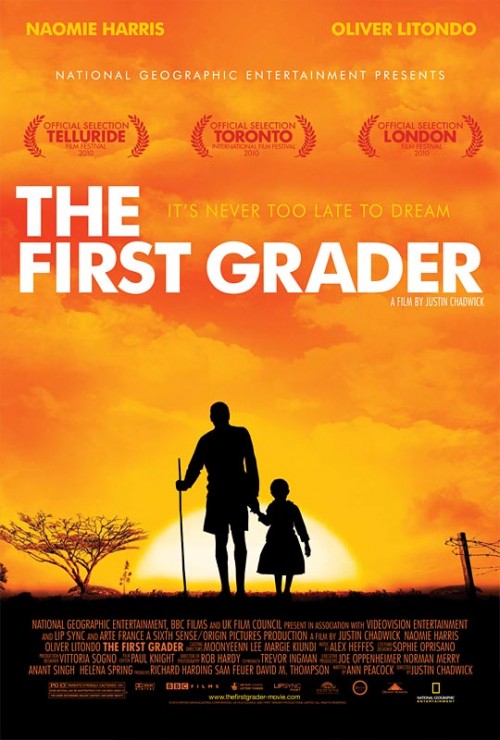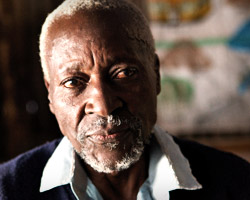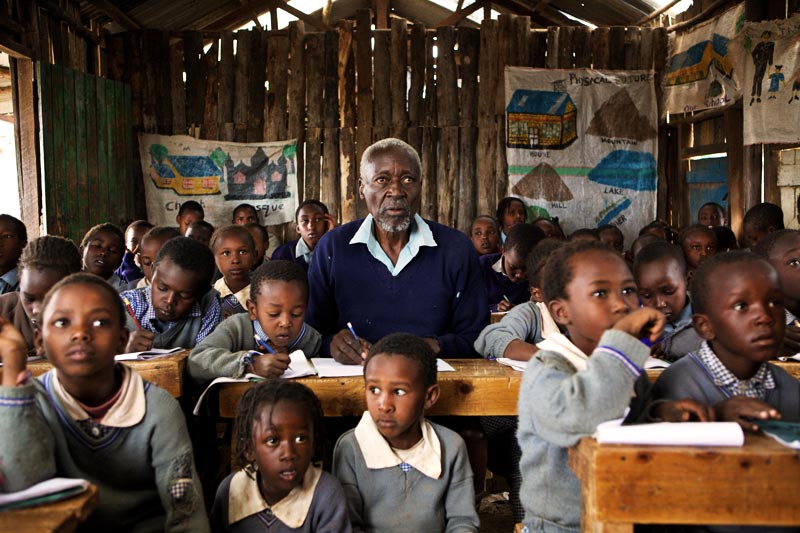Movie review: The First Grader (2010)
Originally posted on Blogger 29 November 2011
The First Grader, directed by Justin Chadwick, is set around 2004 when the Kenyan government announced free education for all. Of course they meant children, but an 84 year old man, Kimani N’gan’ga Maruge, took them at their word – free education for all.
Maruge (played beautifully by Oliver Litondo) has received a letter from the government, but since he can’t read he would like to know exactly what it says. At one point he remarks to journalists that he would like to know what is really in the bible as you can’t completely trust the preachers. He wants to learn to read as he sees this as an important thing to be able to do.
Maruge is from the Kikuyu. In the movie he describes just as the Masai prize their cattle, the Kikuyu prize their land. The British interests in Kenya was in its fertile land (as hard as that may be to believe as Kenya is currently struggling through a devastating drought) and from when it proclaimed Kenya a British protectorate in 1895 the colonialist farmers began setting up plantations in the highlands. In order for this to occur many Kenyans lost their land, either being forced into inferior land or into the labour market.
What has become known as the Mau Mau Rebellion is still quite murky to explain. Basically during the rebellion a state of emergency was declared and the British sent in troops to quash the rebellion but predominantly it was a battle between the Kikuyu with nationalist beliefs and those who became known as being Loyalists (to the British). The number of Kenyans who died between 1952 and 1956 is really unknown but estimates vary between 11,500 to 50,000 with about 200 British soldiers and policemen and 30 European settlers. Although the rebellion was said to have been put down by 1956, the state of emergency was not lifted until around 1960. It is also unclear now many deaths were caused by violence (by all sides) and how many were due to starvation.
Maruge is referred to as being of the Mau Mau, who swore an oath for the return of their lands (although does not say explicitly in the movie that this would mean the expulsion of the white settlers). When he was captured the Loyalist soldiers, in an attempt to get him to renounce his oath, shoot his wife and two children in front of him. It is interesting that through the movie he blames the British when mostly the dirty work was done by other Kikuyu, but the British commanders are the ones giving orders. It would seem that he sees the Loyalists and British as one and the same. It is now recognised that the Mau Mau Rebellion started the move towards Kenya gaining independence in 1964 – the Mau Mau gave Kenyans their future.
What follows for Maruge is years in detention being subjected to inhumane treatment. The story of his life is told in flash backs where it seems he is constantly living with the ghosts of his past.
The head teacher of the small rural primary school, Jane Obinchu (Naomie Harris), makes an ‘executive decision’ to accept Maruge into the class, although not without some initial resistance. However that is just the first hurdle as they face increasingly dangerous opposition from parents and officials who object to this. The argument against allowing Maruge in the class is that they already have 5 students per desk – the Kenyan education system is massively under resourced.
One theme that did interest me is when first Jane and then Maruge are harassed by others for a ‘share’ in the money they received from the journalists. I find this interesting because it has appeared in other African movies, notably in the movies by the great Senegalese Director Ousmane Sembene. It is interesting that not only do people believe they should have a share of the money for something they had no part in, but they also don’t realise that a group of reporters coming from all over the world for a story are unlikely to pay any money for this story. I found this distortion of understanding when I travelled through Africa over 20 years ago when many didn’t realise that I couldn’t go into banks to just take money, I needed to have the money first to be able to get any from the bank.
I was somewhat surprised that I seemed to be the only one in the small cinema who laughed at the funny places, particularly when the children take matters into their own hands, and cried at the beautifully poignant moments towards the end. It leads me to wonder if they really ‘got it’.
This last point reminds me of the beautiful Australian movie 10 Canoes (2006) – a story within a story set in Arnhem Land where during a hunt for goose eggs one young man is told a similar story to his current life that warns of the dangerous consequences of jealousy. All dialogue is in the indigenous dialect of the region with English narration by David Gulpilil (a brilliant Aboriginal actor).
I went to see 10 Canoes with friends and afterwards I discovered that neither of them liked it. I loved it. One of my friends commented that she has seen documentaries on Aboriginal life before. I felt like she missed the point. This wasn’t a documentary; it was a fascinating portrayal of the way acceptable behaviour is taught in indigenous cultures. AND the story is told with a lot of humour.







